Educator-to-Educator Tips & Strategies
Find out how your peers are making the most of Aquifer cases and teaching tools.
Find out how your peers are making the most of Aquifer cases and teaching tools.
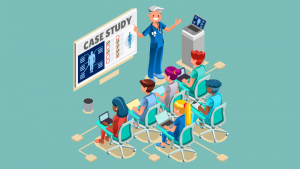
Whether you’re searching for ways to engage students in virtual learning, revamping a stale lecture, or building a new didactic session, flipping the classroom around Aquifer cases is a powerful way to engage your students and help case-based learning stick. Check out different ways that medical educators are integrating Aquifer cases into their pedagogy…
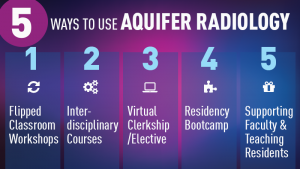
The 19 cases in Aquifer Radiology are designed to meet the needs of a wide range of learners and fit into many teaching modalities. Top radiology educators presented their successful strategies for integrating the cases in our recent webinar–find out what they shared…
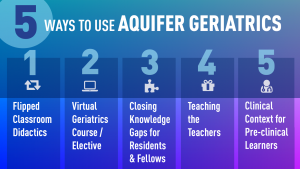
The 27 cases in Aquifer Geriatrics are designed to meet the needs of a wide range of learners and fit into many teaching modalities. Top geriatrics educators from around the country presented their successful strategies for integrating the cases in our recent webinar–find out what they shared…
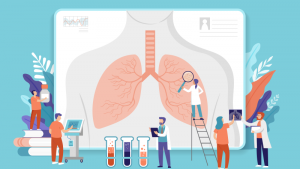
Diagnostic errors are a major source of morbidity and mortality in health care, and there is increasing focus on reducing diagnostic errors in medicine. Fitting these topics into your curriculum can be challenging. To help, I’d like to highlight strategies that educators have found successful using the cases and teaching tools included in Aquifer Diagnostic Excellence.

As the pandemic caused widespread disruption, Aquifer saw an unprecedented jump in the use of our cases–and many innovative ways to use the cases across curricula. Through our grant applications and many ongoing conversations with educators, we were able to identify trends and challenges and gather success stories and strategies to share.

We all know that every student will have a slightly different experience in each of their supervised clinical practice experiences (SCPEs). At our program, we’ve been using Aquifer cases to augment learning, build key communication skills, and supplement clinical experiences to meet ARC-PA standards.

In many Aquifer cases, students are asked to write out a one to three sentence summary statement that mimics the communication skills they need on rounds, calling consults, and writing patient progress notes. Reviewing a selection of these statements provides an opportunity for faculty to provide meaningful, targeted feedback on clinical reasoning skills.
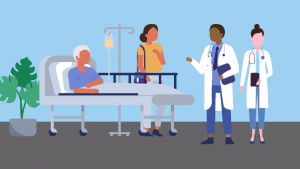
Medical schools have always worked hard to provide fourth-year students with clinical knowledge. But far less time is dedicated to effective, delicately nuanced conversations about diagnoses and prognoses with patients and their families. This gap isn’t new, but it’s being exacerbated by the pandemic. In response, we created an online elective dedicated entirely to learning, thinking about, and practicing these difficult communication skills.

When the COVID 19 pandemic interrupted our first-year medical students’ longitudinal primary care practicum (PCP), we needed to find an alternative that addressed one of its most important goals: helping students to focus the comprehensive history, exam, and documentation that they’re taught in the clinical skills course into a primary care-appropriate presentation and SOAP note. Our thoughts turned quickly to Aquifer, which is used by our internal medicine and pediatrics clerkships. Many Aquifer cases integrate well with the basic science topics our first-year courses, but most seemed a little too advanced for a mid-first year student. At the same time, senior students were eager to find ways to help, so we decided to combine Aquifer cases with ‘virtual’ peer teaching via videoconference.

Many educators are wondering how to meaningfully engage their students in distance learning activities that create community and allow them to practice important patient care skills (while not seeing patients). While I have been doing peer-to-peer consults with educators around the country about using Aquifer cases in their curriculum, I stumbled into a helpful reframe that seems to be unlocking people’s creativity: Aquifer cases (yep…more than 170 of them!) are virtual standardized patients. Wait…what?